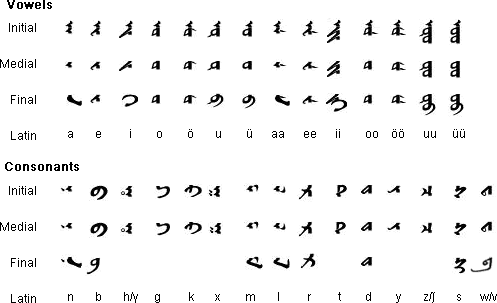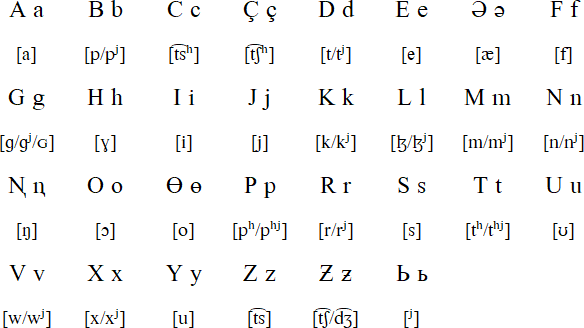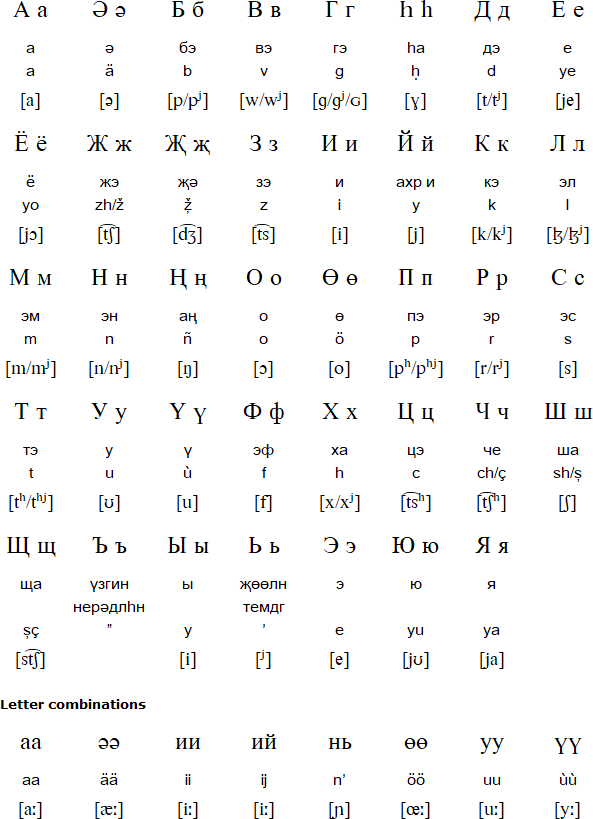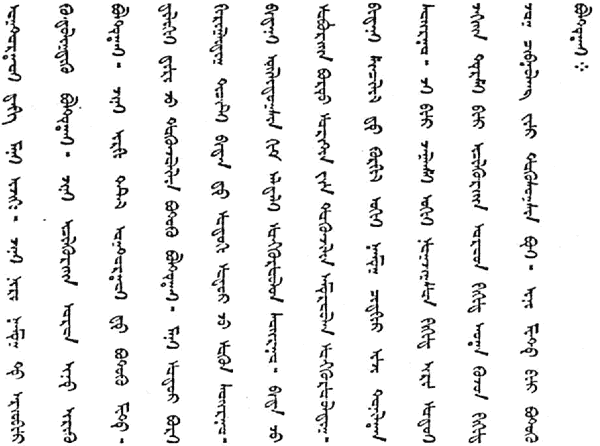![]()
Kalmyk is a member of the Kalmyk-Oirat branch of the Mongolian language family. It is spoken in the Kalmykia Republic in the west of the Russian Federation, and in parts of western China and western Mongolia. In Kalmykia it is known as Kalmyk, while in China and Mongolia it is known as Oirat.
Others names for the language include Kalmyk-Oirat, European Oirat, Kalmack, Kalmuck, Kalmuk, Khalli, Qalmaq, Volga Oirat, Western Mongolian, 卫拉特语 (Wèilātè yǔ) or Xinjiang Mongolian.
In 2010 there were about 183,000 speakers of Kalmyk in Kalmykia, mainly in Astrakhan province. In 2007 there were 130,000 speakers of Kalmyk in western parts China, particularly in Gansu and Qinghai provinces, and in Inner Mongolia and Xinjiang Uyghur Autonomous Region. In 2016 there were about 221,000 speakers of Oirat in Mongolia in the provinces of Bayan-Ölgii, Uvs, Khovd, Khövsgöl, Zavkhan, Govi-Altai and Arkhangai.
Kalmyk was first written with the Uyghur script in the 11th century. Then in 1648 a Kalmyk Buddhist monk called Zaya Pandita Oktorguin Dalai created the Kalmyk alphabet or Todo Bichig (Clear Script) by adapting the Classical Mongolian script. The Clear script is still used by Kalmyks in China. Between 1930 and 1938 Kalmyk was written with a version of the Latin alphabet. Modern written Kalmyk is based on the Torgut dialect.
The Kalmyk-Oirat Clear Script is written in vertical columns running from top to bottom and left to right. Each letter has a different shape depending where it appears in a word, and special symbols are used for combinations of some letters.


In Russia Kalmyk has been written with various versions of the Cyrillic alphabet since the end of the 19th century. A standard way of writing Kalmyk with the Cyrillic alphabet was adopted in 1924. This was revised several times after that, and replaced by the Latin alphabet between 1930 and 1938. A new version of the Cyrillic alphabet was used from 1938, and that was revivsed in the 1941, and again in the 1950s.

Information about Kalmyk pronunciation compiled by Wolfram Siegel.
Download an alphabet chart for Kalmyk (Excel)

Мана Теңгрин эцк! Нернтн әрүн болтха! Тана йосн иртхә! Тенгрт бутсн таалтн һазр деер бүттхә! Эркн кергтә өдмг Эндр өдрт илгәһит! Яһҗ бидн күүнә килнц тәвнәвидн, Тиигҗ Та килнцмдн тәвүлит! Сөрдг юмнла бичә харһулыт! Эрлгәс гетлгит!
Mana Teñgrin eck! Nerntn ärün boltxa! Tana josn irtxä! Tengrt butsn taaltn hazr deer büttxä! Erkn kergtä ödmg Endr ödrt ilgähit! Jahǧ bidn küünä kilnc täwnäwidn, Tiigǧ Ta kilncmdn täwülit! Sördg jumnla bičä xarhulyt! Erlgäs getlgit!
Our Father, who art in heaven, hallowed be thy name;
thy kingdom come, thy will be done, on earth as it is in heaven.
Give us this day our daily bread, and forgive us our trespasses,
as we forgive those who trespass against us;
and lead us not into temptation, but deliver us from evil.
Amen.
Source: http://www.christusrex.org/www1/pater/JPN-kalmyk.html
Information about Kalmyk | Phrases | Numbers | Tower of Babel
Information about the Kalmyk language
http://en.wikipedia.org/wiki/Kalmyk_language
https://fr.wikipedia.org/wiki/Kalmouk
http://www.rosettaproject.org/archive/altaic/europe/kgz/view?searchterm=kalmyk
Information about the Kalmyk-Oirat Clear Script
http://meta.wikimedia.org/wiki/Todo_Bichig
Kalmyk American Society
http://www.kalmykamericansociety.org
Alasha, Barin, Buryat, Chakhar, Daur, Jarud, Kalmyk, Khamnigan Mongol, Khorchin, Mogholi, Mongolian, Monguor, Santa / Dongxiang
Abaza, Abkhaz, Adyghe, Aghul, Akhvakh, Akkala Sámi, Aleut, Altay, Alyutor, Andi, Archi, Assyrian / Neo-Assyrian, Avar, Azeri, Bagvalal, Balkar, Bashkir, Belarusian, Bezhta, Bosnian, Botlikh, Budukh, Bulgarian, Buryat, Chamalal, Chechen, Chelkan, Chukchi, Chulym, Chuvash, Crimean Tatar, Dargwa, Daur, Dolgan, Dungan, Enets, Erzya, Even, Evenki, Gagauz, Godoberi, Hinukh, Hunzib, Ingush, Interslavic, Itelmen, Juhuri, Kabardian, Kaitag, Kalderash Romani, Kalmyk, Karaim, Karakalpak, Karata, Karelian, Kazakh, Ket, Khakas, Khanty, Khinalug, Khorasani Turkic, Khwarshi, Kildin Sámi, Kili, Komi, Koryak, Krymchak, Kryts, Kubachi, Kumandy, Kumyk, Kurdish, Kyrgyz, Lak, Lezgi, Lingua Franca Nova, Lithuanian, Ludic, Macedonian, Mansi, Mari, Moksha, Moldovan, Mongolian, Montenegrin, Nanai, Negidal, Nenets, Nganasan, Nivkh, Nogai, Old Church Slavonic, Oroch, Orok, Ossetian, Pontic Greek, Romanian, Rushani, Russian, Rusyn, Rutul, Selkup, Serbian, Shor, Shughni, Siberian Tatar, Sirenik, Slovio, Soyot, Tabassaran, Tajik, Talysh, Tat, Tatar, Teleut, Ter Sámi, Tindi, Tofa, Tsakhur, Tsez, Turkmen, Tuvan, Ubykh, Udege, Udi, Udmurt, Ukrainian, Ulch, Urum, Uyghur, Uzbek, Veps, Votic, Wakhi, West Polesian, Xibe, Yaghnobi, Yakut, Yazghulami, Yukaghir (Northern / Tundra), Yukaghir (Southern / Kolyma), Yupik (Central Siberian)
Languages written with the Latin alphabet
A-chik Tokbirim, Adinkra, ADLaM, Armenian, Avestan, Avoiuli, Bactrian, Bassa (Vah), Beitha Kukju, Beria (Zaghawa), Borama / Gadabuursi, Carian, Carpathian Basin Rovas, Chinuk pipa, Chisoi, Coorgi-Cox, Coptic, Cyrillic, Dalecarlian runes, Elbasan, Etruscan, Faliscan, Fox, Galik, Georgian (Asomtavruli), Georgian (Nuskhuri), Georgian (Mkhedruli), Glagolitic, Global Alphabet, Gothic, Greek, Hurûf-ı munfasıla, Irish (Uncial), Kaddare, Kayah Li, Khatt-i-Badí’, Khazarian Rovas, Koch, Korean, Latin, Lepontic, Luo Lakeside Script, Lycian, Lydian, Manchu, Mandaic, Mandombe, Marsiliana, Medefaidrin, Messapic, Mongolian, Mro, Mundari Bani, Nag Chiki, Naasioi Otomaung, N'Ko, North Picene, Novo Tupi, Nyiakeng Puachue Hmong, Odùduwà, Ogham, Old Church Slavonic, Oirat Clear Script, Ol Chiki (Ol Cemet' / Santali), Old Italic, Old Nubian, Old Permic, Ol Onal, Orkhon, Osage, Oscan, Osmanya (Somali), Pau Cin Hau, Phrygian, Pollard script, Runic, Székely-Hungarian Rovás (Hungarian Runes), South Picene, Sutton SignWriting, Sunuwar, Tai Viet, Tangsa, Todhri, Toto, Umbrian, (Old) Uyghur, Wancho, Yezidi, Zoulai
Page last modified: 15.03.23
[top]
You can support this site by Buying Me A Coffee, and if you like what you see on this page, you can use the buttons below to share it with people you know.

If you like this site and find it useful, you can support it by making a donation via PayPal or Patreon, or by contributing in other ways. Omniglot is how I make my living.
Note: all links on this site to Amazon.com, Amazon.co.uk
and Amazon.fr
are affiliate links. This means I earn a commission if you click on any of them and buy something. So by clicking on these links you can help to support this site.
[top]